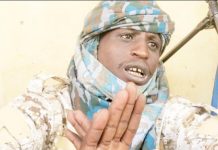Former President Olusegun Obasanjo has narrated the encounter he had with Boko Haram members in 2011.
The former president had met with members of the sect and some family members of Mohammed Yusuf, founder of the group.
Upon his arrival at the Maiduguri airport, Obasanjo was received by the then deputy governor, Zanna Umar Mustapha.
The meeting, which was held at Yusuf’s family members at Railway Quarters, the demolished headquarters of the sect, lasted about 90 minutes.
Speaking at the meeting, as reported as Daily Trust, Obasanjo had said, “This is a personal initiative. I urge you to forgive and forget the past. I plead with you, give me the chance to mediate between the family and government.”
In response, Babakura Fugu, Yusuf’s brother-in-law, whose father was executed in 2009, had said, “Since 2009, this is the first time any high profile figure would be commiserating with the family.
“We are happy with this visit. About 30 to 40 per cent of our members are scattered in neighbouring countries of Chad, Niger and Cameroun.”
Sadly, Fugu was gunned down 24 hours after Obasanjo’s visit.
Speaking at the 2022 annual lecture of the Murtala Muhammed Foundation (MMF), which held on Monday, Obasanjo said his fear about Boko Haram insurgency had materialised with their links with international terrorist organisations.
He said the group did not have external connection at the time he met with them but the poor handling on the part of the government made the crisis to go out of hand.
He also blamed insecurity in the country on the access to weapons after the Nigerian civil war.
The programme had as its theme, “Beyond Boko Haram: Addressing Insurgency, Banditry and Kidnapping across Nigeria”.
Obasanjo said, “We are not going anywhere until we take national building seriously. Justice and equity. We must build a society where everyone feels it has a stake. The insecurity in the country was caused as a result of the ease to access weapons and since then we have been unable to address the issue; it keeps getting worse.
“In 2011 when Boko Haram was just rearing its ugly head, I went to Maiduguri to try and find out a little bit more about Boko Haram and to also find out what their objective was apart from being interested in Sharia, they also complained that their followers had no job and, in their effort, to getting something legitimate efforts to help their members.
“In the process the government started chasing them and gunning them down. What I feared at that time seem to have been happening at that time, Boko Haram had not much external connections then, the ones they had would be Nigerians who had resources abroad, who were helping them.”





